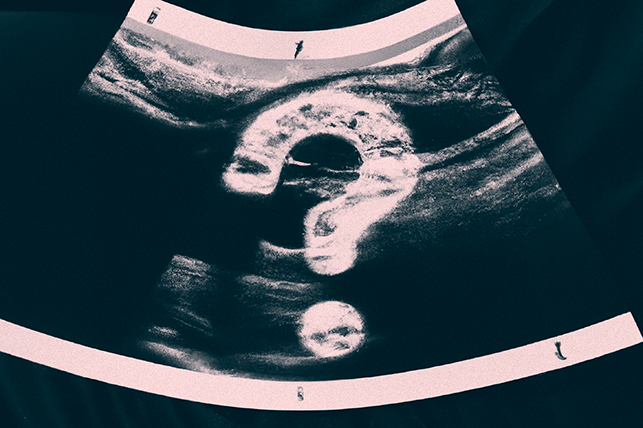Is Hysterical Pregnancy a Real Thing?

A hysterical pregnancy, also known as a false pregnancy, phantom pregnancy or pseudocyesis, happens when a woman believes she is pregnant and experiences the symptoms of pregnancy without carrying a baby.
Although the condition means you are not pregnant, the physical and psychological symptoms are very real, and it's estimated that between one and six cases occur in every 22,000 births.
Let's explore the common symptoms of hysterical pregnancy, how to get accurately tested and the possible underlying causes behind this condition.
What are the symptoms of hysterical pregnancy?
The physical symptoms of hysterical pregnancy are sometimes intense enough to not only fool an individual but other people as well. A woman may wholeheartedly believe she is pregnant and experience symptoms which include but are not limited to:
- Missed periods
- Weight gain
- A growing abdomen
- Morning sickness
- Urinary frequency
- Breast changes, such as pigmentation, lactation and enlargement
- Enlarged uterus
- Cervical softening
Are there tests to determine a hysterical pregnancy?
The tests to determine a hysterical or false pregnancy are the same ones used to find out about a regular pregnancy. The doctor examines your physical symptoms, takes ultrasounds of the abdomen and requests urine and blood tests.
The ultrasound will reveal that there's no baby growing in your belly, but further tests may be required to find out if another medical condition could explain the physical symptoms. For example, conditions such as obesity, rare forms of cancer and ectopic pregnancy can lead to similar physical symptoms and sharp hormonal changes.
What causes hysterical pregnancy?
Although there's no scientific consensus yet, the most plausible theories all focus on the psychological state of the women who struggle with hysterical pregnancy, with some also suggesting a serious health condition as the cause.
The mind and body are deeply interconnected, which explains how women can experience the physical symptoms of pregnancy without carrying a baby even if the underlying cause is a psychological issue.
"In many cases, these women have experienced some type of past emotional trauma, like sexual abuse, or have experienced extreme poverty," said Kecia Gaither, M.D., who is board-certified in OB-GYN and maternal-fetal medicine and the director of perinatal services/maternal-fetal medicine at NYC Health + Hospitals/Lincoln in the Bronx in New York City.
'In many cases, these women have experienced some type of past emotional trauma, like sexual abuse, or have experienced extreme poverty.'
One theory focuses on the intense emotions of the person. A woman may have a considerable desire to get pregnant or a fear of getting pregnant.
If you feel a lot of pressure or anxiety about a potential pregnancy, then your psychological state can affect your endocrine system, cause hormonal changes and lead to symptoms of pregnancy. For example, the accumulation of gas, fat and feces through constipation or stress activating the sympathetic nervous system can cause the belly to get bigger and abdominal discomfort, which can feel like kicks from a fetus.
This desire-based theory explains why the condition is more common in women who have had trouble getting pregnant, have lost an infant or had a miscarriage, have gone through poverty or related trauma, or live in cultures that heavily emphasize motherhood and having a family.
Another theory focuses on underlying health conditions that could be causing the physical symptoms. Ovarian tumors and rare forms of cancer, severe cases of obesity, ectopic pregnancy and a host of other conditions can cause similar symptoms as those of pregnancy.
How to treat this condition
Comprehensive medical tests should be done to find out if there is an underlying medical cause for a false pregnancy. If there is another condition causing the symptoms, then appropriate treatment can be suggested and certain medications may be given to manage some of the symptoms.
"One of the successful methods of ending pseudocyesis is to show the person evidence of the absence of a fetus on an ultrasound," said Hana Patel, M.B.B.S., M.Sc., a private general practitioner in women's health and mental health and a mindset coach in London.
Furthermore, it's recommended to try speaking with a therapist for a psychological consultation or examination to assess underlying neurological or psychological conditions, because a false pregnancy can be a sign of many repressed thoughts and mental health problems. Additionally, emotional support and/or psychotherapy can help treat pseudocyesis.
How to help someone with this condition
Regardless of the underlying cause, you can help somebody going through a false pregnancy when you stay by their side and offer your company and emotional support. If the reason is a mental health issue, you can help them come to terms with reality, encourage them to seek therapy and help them remove stressors and negative thoughts from their life.
"Pseudocyesis can cause feelings of stress, fear, anticipation and general emotional disturbance to the person, and until their physical symptoms are managed, it may be difficult to help address the psychological symptoms," Patel said.


















